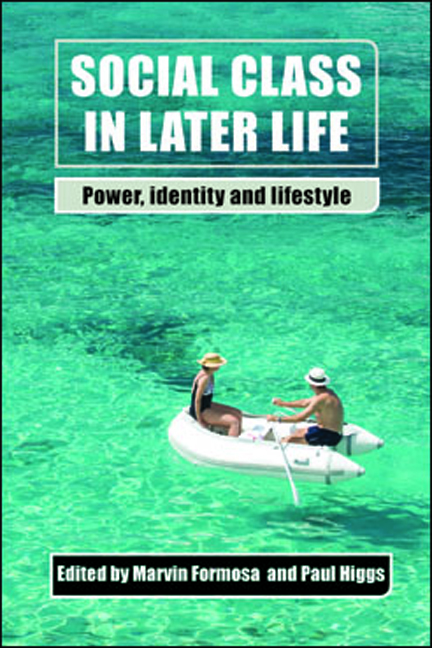Book contents
- Frontmatter
- Dedication
- Contents
- List of tables and figures
- Foreword
- Preface
- Notes on contributors
- one Introduction
- two Social class structures and social mobility: the background context
- three Ageing and class in a globalised world
- four Measuring social class in later life
- five Social class, age and identity in later life
- six Class, pensions and old-age security
- seven Class and health inequalities in later life
- eight Class, care and caring
- nine Social work, class and later life
- ten The changing significance of social class in later life
- Index
Foreword
Published online by Cambridge University Press: 03 February 2022
- Frontmatter
- Dedication
- Contents
- List of tables and figures
- Foreword
- Preface
- Notes on contributors
- one Introduction
- two Social class structures and social mobility: the background context
- three Ageing and class in a globalised world
- four Measuring social class in later life
- five Social class, age and identity in later life
- six Class, pensions and old-age security
- seven Class and health inequalities in later life
- eight Class, care and caring
- nine Social work, class and later life
- ten The changing significance of social class in later life
- Index
Summary
Social divisions in human societies have preoccupied social scientists in general, and sociologists in particular, since the beginning of these disciplines. From the original writings of Auguste Comte in the founding of sociology and the great giants of the nineteenth century, Karl Marx, Max Weber and Emile Durkheim, social class became a central and enduring theme. The class struggle characterised by Marx as between the owners of capital and those who sold their labour to them, ran through his entire published work. Weber's challenge in his seminal essay Class, status and party (1961) to Marx's dominating bifurcation of societies in Capital (1970) set the framework of discourse and analysis for a hundred years. In it Weber details the human desire for social power and how, through class, certain forms of power are achieved. Nevertheless, he shares with Marx the belief that property is the basic category that defines class situation.
The debates about class formation and the hierarchies of status and power continued in full force throughout the post-Second World War explosion of sociological enquiry. In the 1960s, when departments of sociology were flowering in many new universities across North America and Western Europe, the academic journals and textbooks were preoccupied with class, family and community. Economic growth and democratised modern societies developed new middle classes and gave rise to studies of social mobility and embourgeoisement. But as the 20th century moved into its final quarter, enthusiasm for social stratification waned. Modernism, postmodernism and feminism, among other new domains of interest, nudged class out of the way and until recently its proponents have spoken with small voices.
Two of the ‘new’ subdisciplines which became prominent as class lost its salience were the overlapping fields of gerontology and medical sociology. Both had roots in the inequalities of health and longevity which had grown out of public health and epidemiology. They were fuelled by the needs of governments and the desire of health professionals to understand the social, economic and lifestyle correlates of ill health at different stages of the lifepath. These imperatives generated empirical and public policy oriented enquiries which recognised social class as an important variable, rather than a subject of independent enquiry.
- Type
- Chapter
- Information
- Social Class in Later LifePower, Identity and Lifestyle, pp. vii - xiiPublisher: Bristol University PressPrint publication year: 2013



